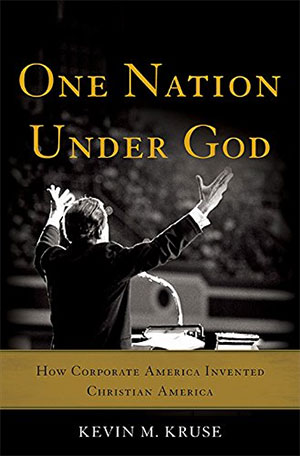 Princeton history professor Kevin Kruse’s new book, One Nation Under God: How Corporate America Invented Christian America (Basic Books, $29.99), engagingly traces the rise of the Christian Right as a political force in America.
Princeton history professor Kevin Kruse’s new book, One Nation Under God: How Corporate America Invented Christian America (Basic Books, $29.99), engagingly traces the rise of the Christian Right as a political force in America.
Kruse explores how business interests of the 1930s fought back against the New Deal and, in an attempt to counteract government regulation and oversight, enlisted the aid of religion. This Christian libertarianism “linked capitalism and Christianity and, at the same time, likened the welfare state to godless paganism.”
That movement eventually mutated into something far more powerful. Kruse summarizes this development:
In their struggle against the New Deal, the business lobbies of the Depression era had allied themselves with conservative religious and cultural leaders and, in so doing, set in motion a new dynamic in American politics. The activism of Christian libertarians such as James Fifield and Abraham Vereide had sought to provide the right with its own brand of public religion that could challenge the Social Gospel of the left. But the rhetoric and rituals they created to topple the New Deal lived on long after their heyday, becoming a constant in American political life in the Eisenhower era and beyond.
Much of Kruse’s book centers around the “twin pillars of ceremonial deism,” embodied in the phrases “one nation under God” and “in God we trust.” Kruse traces the history of these mottos as they became central tenets of American identity, dictums that bolstered the notion that America is, and always has been, an explicitly Christian nation, despite their relatively recent entrance onto the public stage.
Billy Graham also plays a pivotal role in the book — his shadow looms large over the modern conflation of religion and politics. Describing his influence in the Nixon White House, Kruse says “His words and deeds helped make piety and patriotism seem the sole property of the religious right.”
Sadly, this legacy still reverberates through modern political discourse. Graham’s 1951 quote about the plight of the poor is a concise summary of the often misguided priorities that still drive the Christian Right: “Their greatest need is not more money, food, or even medicine; it is Christ. Give them the Gospel of love and grace first and they will clean themselves up, educate themselves, and better their economic conditions.”
One Nation Under God is a historical narrative, not a theological or political treatise. In telling the story of “a national debate about the proper relationships between piety and patriotism, religion and politics, church and state,” Kruse doesn’t take sides, instead letting the individuals involved in these debates speak for themselves.
His goal is to simply remind us of the recent history of our nation’s struggle to balance religious and political life. Regardless of one’s theological or political position, the truth of the matter is, as Kruse lays out in meticulously but readable detail, that “our public religion is, in large measure, an invention of the modern era.”
Reading Kruse’s book is both an eye-opening and frustrating experience.
Eye-opening because Kruse capably relates a historical narrative that “has been largely obscured by the very ideology that resulted from it.” Prior to reading this book, I naively thought that “E Pluribus Unum” was our national motto, that Billy Graham was generally apolitical in his ministry, that the overt Christianity of recent American Presidents wasn’t a particularly new development and that the Ten Commandments monument in front of my local courthouse wasn’t directly connected to the marketing campaign for Cecille B. DeMille’s film.
But my overwhelming feeling when reading One Nation Under God was one of frustration. Not with the text itself, which I thoroughly enjoyed, but with America’s continual inability to deal with religious issues in a reasonable and rational manner. The same battles that were being fought a half-century ago are still being fought today, seemingly without progress. Are we destined to rehash the same petty skirmishes over the Bible, prayer and religious expression again and again? Will we ever be able to successfully balance the rights and freedoms of all Americans?
One Nation Under God is an important book. We — Christians and Americans — need to understand our history. This history consists of far more than the agenda-driven narratives promulgated by advocacy groups, it also includes word and events and motivations that have all too often been conveniently forgotten. In One Nation Under God Kruse offers us a potent reminder of where we have come from, and, perhaps more importantly, how far we still have to go.
 Dan Wilkinson
Dan Wilkinson
Dan is the Executive Editor of the Unfundamentalist blog. He is a writer, graphic designer and IT specialist. He lives in Montana, is married and lives with two cats.
Leave a Reply